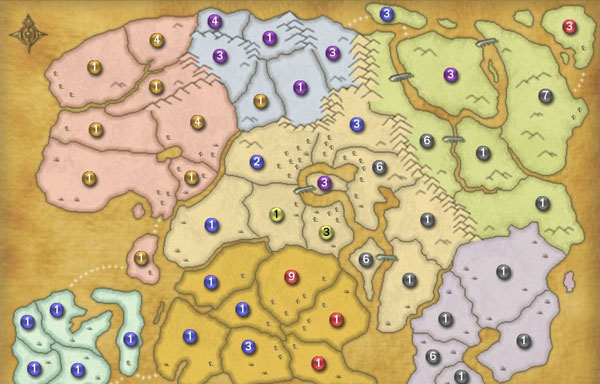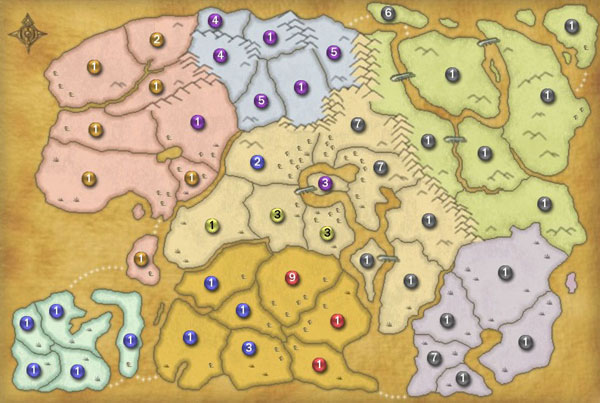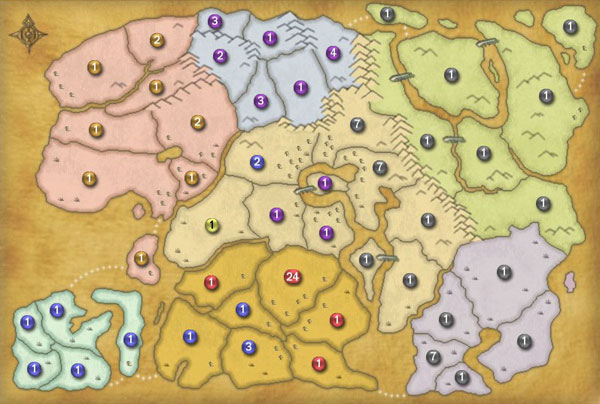As you saw in Part 1, the initial start in Risk is quite critical and if you don’t get it right you can fail spectacularly. Opening moves in Risk are much like Chess. They set the pace of the game, define the strategic positions which would come to define the rest of the game. It is always possible to get away with a single mistake, but a series of mistakes is lethal. If you realise you have already made a mistake, beware that you can’t afford to risk anymore and need to play conservatively thinking about all possible consequences before you make your decision. Let’s analyse the game further to see what happened and what went wrong.
Several things went wrong in the game where Red did not pay attention to several critical elements:
- Over expansion. Fighting armies will cost you. If your goal is more difficult to achieve than others, you should assume that others will get to their simpler goals sooner than you. It is critical to think of what they would do next when they get to their goals. For example, if other are aiming for smaller continents than you, it is more likely for them to conquer their before you. You need to think of their options once they have conquered their continent and while you are still short of conquering yours.
- Neighbours options. If you have a neighbour whose goal is simpler than yours, such as going for a smaller continent, think very carefully on how you are going to deal with this particular neighbour. Sooner or later he needs to expand and if you haven’t secured your continent yet, he will have all the incentives in the world to slow you down even further.
- Runaway Opponent. Sometimes, you may have a lucky player who is way ahead of others or is capable of creating a gap between himself and all other players. You should NEVER neglect this. Players selfishly carry on with their local agenda while the strong gets stronger faster than all others. Naturally sooner or later he is going to pick on other players. In an escalating game, where cards values are increased, a strong player can use a chain strategy to eliminate many players in a single turn. He can do this by eliminating one player, cash the collected cards and then attack the next person using the extra armies and so on as long as he can continue. This is why you need to take steps to balance the world power. If you don’t have enough armies, you should resort to diplomacy and make everyone else aware of the danger of selfishly following their own agenda. This is not as hard as you think and you can’t afford to ignore it.
- Going for Continents. Most players like to go for continents. This is natural as you get extra bonuses which you can use to expand rapidly. However, continents give you a specific bonus only once you conquer them. There is a cost to pay to get a continent. Hence, you should treat it like an investment. First, you put a lot into it hoping that years (turns) later you will get back more than your original investment. There are many risks involved such as bad luck in conquering the continent or neighbours attacking you. You may need to defend yourself somewhere else and not being able to afford to protect your investment as much as you should. All of this means that some players prefer not to go for continents at all and instead concentrate their armies by not fighting. They reckon that not losing armies as a result of not fighting gives them as much advantage as average bonuses of a continent. This is a perfect strategy to follow when you have a bad start in a game and don’t see a clear affordable path to a continent. Interestingly, many players don’t follow this simple rule and pay dearly. By following this simple strategy, you can significantly increase your chances of winning Risk against others who are not aware of this.
Next, let’s see what you could have done when you found yourself in this dire situation.
Move 5.
You have three cards at this point. Blue has just cashed in. You think your only move is survival. In Risk, the best survival strategy is to stay away from others, make it expensive for them to eliminate you while giving them little incentive to attack you. Having too many cards is bad, because your cards become lucrative to others as the game progresses forward. On the other hand, if you occupy a non-strategic position with lots of armies, players will have little incentive to attack you as there is not much to gain but a lot to lose. For your move, you decide to get one more card in the hope of cashing it the next turn to concentrate your armies. This is a gamble, but at this point you have not much to lose. You concentrate your armies as much as you can.

Move 6.
Meanwhile Black is expanding rapidly and not a single player seems to be doing anything about it. They are all focused on their own continents, as if that’s what it all matters in this game.

Move 7.
Now, finally you can cash in your cards. You dump them all in one territory that has access to many places while it is out of the way of others. This gives you manoeuvrability while still staying isolated. At this point, you only want to be a threat when someone attacks you. Your huge army is certainly a cause for concern for all players since you can just pick on anyone and severely weaken them.

You are now in a much better position and have survived the initial mistakes and bad luck. However, it is not all over yet. Do you have a chance to go on and win the game? What would you do now? What do you think of Blue and Black? Who is the biggest threat and finally, who is the most likely to win this game and why?
What did you learn from this example?